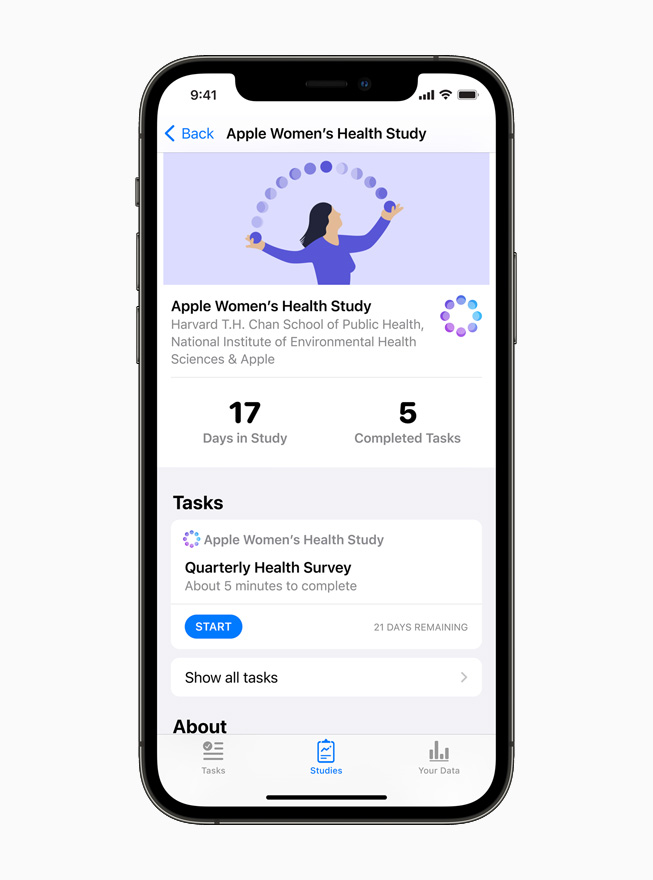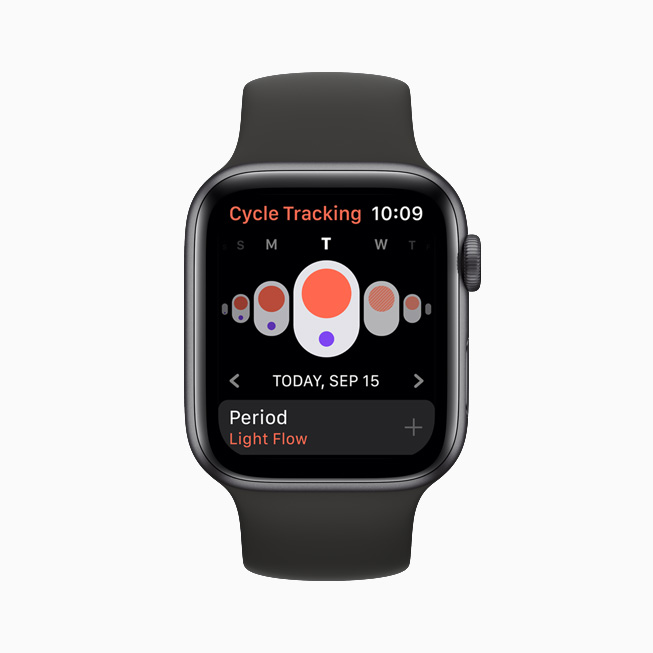UPDATE
09 March 2021
Apple Women’s Health Study releases preliminary data to help destigmatize menstrual symptoms
The landmark study’s first set of data is significant in its scope and scale, offering insights into menstruation and the experiences of women across the US
The Apple Women’s Health Study team at Harvard T.H. Chan School of Public Health today released a preliminary study update, offering pioneering scientific insights on women and their menstrual symptoms, made possible through the innovative research methodology of the Research app. The update, based on a cohort of 10,000 participants and inclusive of varying ages and races across the US, highlights how large-scale, longitudinal research on menstruation can help advance the science around women’s health and destigmatize menstruation.
Many physicians regard women’s menstrual cycles as an important window into their overall health, but the topic is notably under-researched. Medical research on menstruation has often been limited to studies of smaller sizes, which are not representative of the broader population. Without substantial scientific data, women’s menstrual symptoms have historically lent themselves to dismissal, or have even been minimized as overreaction or oversensitivity.
Through the Research app, the Apple Women’s Health Study invites women across the US to contribute to research simply by using their iPhone, and Apple Watch if they have one. The landmark study allows for collection of a comprehensive set of cycle tracking and other health data, strengthened through participant surveys, from individuals across various stages of their life, varying races, and throughout all US states and territories. Participants control the data types shared with the study, with transparency into how the data will be used for the purposes of the study.
Harvard Chan School researchers’ preliminary analysis of data, from a cohort of the first 10,000 participants to enroll in the study and respond to a demographics survey, validates women’s experiences of a wide range of menstrual cycle symptoms including some that are less commonly known or discussed. The most frequently tracked symptoms were abdominal cramps, bloating, and tiredness, all of which were experienced by more than 60 percent of participants who logged symptoms. More than half of the participants who logged symptoms reported acne and headaches. Some less widely recognized symptoms, like diarrhea and sleep changes, were tracked by 37 percent of participants logging symptoms.
Initial analysis also suggests these symptom trends hold true across a wide range of demographics, including age, race, and geographic location. For example, across Black, Hispanic, and white participants, the most commonly reported symptoms were abdominal cramps, bloating, and tiredness.
“Our study will help to achieve a more gender equal future, in which all people with menstrual cycles have access to the health services and menstrual products needed to feel safe and empowered,” said Dr. Michelle Williams, Dean of the Faculty at Harvard Chan School. “By building a robust generalizable knowledge base, the Apple Women’s Health Study is helping us understand factors that make menstruation difficult and isolating for some people, in addition to elevating awareness of a monthly experience shared by women around the world.”
“These findings take us a step further in validating and destigmatizing period symptoms,” said Dr. Sumbul Desai, Apple’s vice president of Health. “Harvard Chan researchers are leaders in the field on this critically important subject, and we couldn’t be more proud to support and help scale their efforts through the Research app.”
The study team will further investigate the preliminary data and submit a detailed analysis, including a breakdown of methods, for peer review and journal publication.
“The preliminary data we are sharing today suggests women across the country have a shared experience of a wide range of menstrual symptoms, and that this natural monthly occurrence is something we should be having more discussions about,” said Dr. Shruthi Mahalingaiah, one of the study’s principal investigators and an assistant professor of environmental, reproductive, and women’s health at the Harvard Chan School. “We look forward to continuing our work to create a long-term, foundational data set over time, which can inspire more research going forward.”
The Apple Women’s Health Study is a first-of-its-kind research study that aims to advance the understanding of menstrual cycles and how they relate to various health conditions such as polycystic ovary syndrome, infertility, and menopausal transition. iPhone and Apple Watch users across the US download the Research app to enroll in the study, conducted in partnership with Harvard T.H. Chan School of Public Health and the NIH’s National Institute of Environmental Health Sciences (NIEHS). Participants must be at least 18 years old (at least 19 years old in Alabama and Nebraska and at least 21 years old in Puerto Rico) and have menstruated at least once in their life.
Share article
Images of Women’s Health Study and Cycle Tracking

